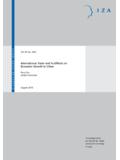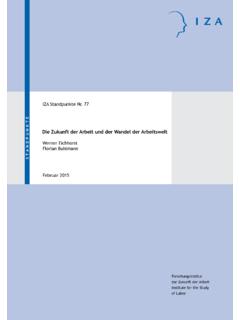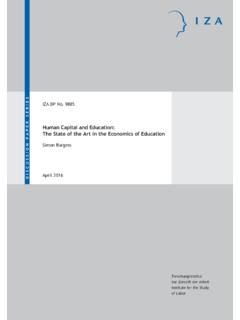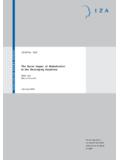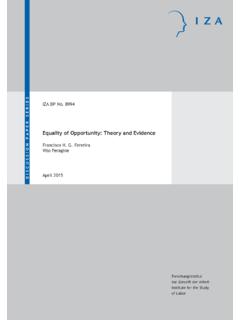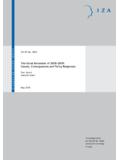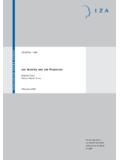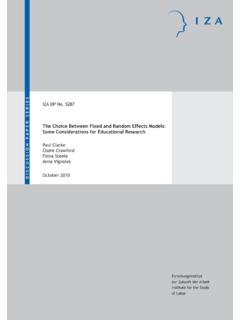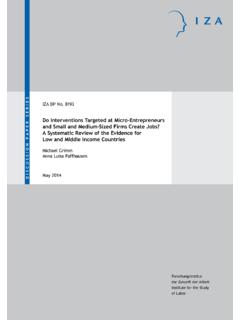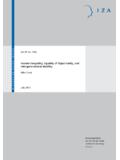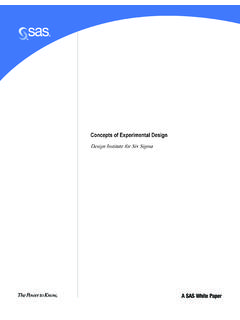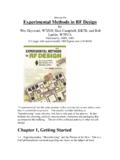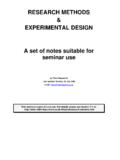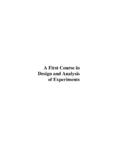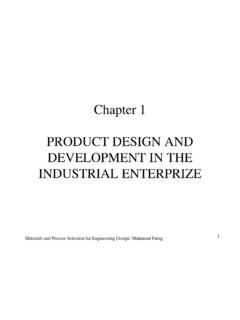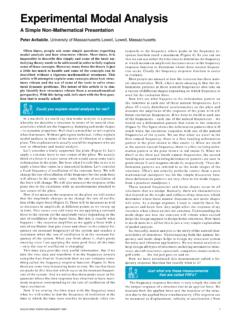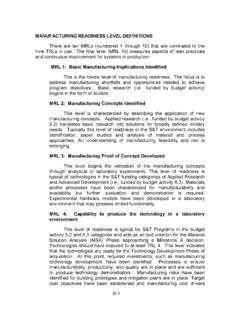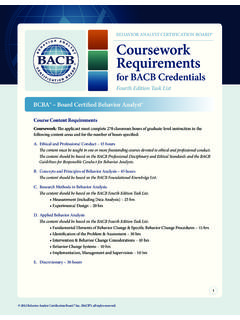Transcription of IZA DP No. 4087
1 DISCUSSION PAPER SERIES. iza dp no . 4087. Measuring Trust: Experiments and Surveys in Contrast and Combination Michael Naef J rgen Schupp March 2009. Forschungsinstitut zur Zukunft der Arbeit Institute for the Study of Labor Measuring Trust: Experiments and Surveys in Contrast and Combination Michael Naef Royal Holloway, University of London J rgen Schupp SOEP, DIW Berlin and IZA. Discussion Paper No. 4087. March 2009. IZA. Box 7240. 53072 Bonn Germany Phone: +49-228-3894-0. Fax: +49-228-3894-180. E-mail: Any opinions expressed here are those of the author(s) and not those of IZA.
2 Research published in this series may include views on policy, but the institute itself takes no institutional policy positions. The Institute for the Study of Labor (IZA) in Bonn is a local and virtual international research center and a place of communication between science, politics and business. IZA is an independent nonprofit organization supported by Deutsche Post Foundation. The center is associated with the University of Bonn and offers a stimulating research environment through its international network, workshops and conferences, data service, project support, research visits and doctoral program.
3 IZA engages in (i). original and internationally competitive research in all fields of labor economics, (ii) development of policy concepts, and (iii) dissemination of research results and concepts to the interested public. IZA Discussion Papers often represent preliminary work and are circulated to encourage discussion. Citation of such a paper should account for its provisional character. A revised version may be available directly from the author. IZA Discussion Paper No. 4087. March 2009. ABSTRACT. Measuring Trust: Experiments and Surveys in Contrast and Combination*. Trust is a concept that has attracted significant attention in economic theory and research within the last two decades: it has been applied in a number of contexts and has been investigated both as an explanatory and as a dependent variable.
4 In this paper, we explore the questions of what exactly is measured by the diverse survey-derived scales and experiments claiming to measure trust, and how these different measures are related. Using nationally representative data, we test a commonly used experimental measure of trust for robustness to a number of interferences, finding it to be mostly unsusceptible to stake size, the extent of strategy space, the use of the strategy method, and the characteristics of the experimenters. Inspired by criticism of the widespread trust question used in many surveys, we created a new, improved survey trust scale consisting of three short statements.
5 We show that the dimension of this scale is distinct from trust in institutions and trust in known others. Our new scale is a valid and reliable measure of trust in strangers. The scale is valid in the sense that it correlates with trusting behaviour in the experiment. Both survey and experimental measure correlate with related factors such as risk aversion, being an entrepreneur or a shareholder. Furthermore, we demonstrate that the survey measure's test- retest reliability (six weeks) is high. The experimental measure of trust is, on the other hand, not significantly correlated with trust in institutions nor with trust in known others.
6 We conclude that the experimental measure of trust refers not to trust in a general sense, but specifically to trust in strangers. JEL Classification: C83, C91, D63, Z13. Keywords: trust, experiment, survey, representativity, SOEP. Corresponding author: J rgen Schupp Socio-Economic Panel Study (SOEP). DIW Berlin D-10108 Berlin Germany E-mail: *. We want to thank Ernst Fehr, Urs Fischbacher and Gert G. Wagner with who we designed the survey, for their contribution and helpful comments; Andreas Stocker and Bernhard von Rosenbladt for their support in finding practical solutions for the field work of the surveys; and Deborah Anne Bowen for her critical review of the manuscript.
7 1 Introduction In surveys like the General Social Survey (GSS) or the World Values Survey (WVS), trust is measured with the statement Generally speaking, would you say that most people can be trusted or that you can't be too careful in dealing with people? This measure of trust has been criticized and its behavioural relevance has been called into question. The first systematic study of the relation between survey and behavioural measures of trust was reported by Glaeser et al. (2000). They investigated whether behaviour in a trust game is correlated with this standard survey measure of trust.
8 They find that the above question is not correlated with trusting behaviour. This result has been replicated in several other studies ( , Ashraf et al. 2003, Ermisch et al. 2007, Gachter et al. 2004, Haile et al. 2008, Holm & Nystedt 2008, Johansson-Stenman et al. 2005b). However, other studies have found a significant correlation between the survey and the experimental measures ( , Vyrastekova & Garikipati 2005, Bellemare & Kroeger 2007, Sapienza et al. 2007). Based on the previous research one cannot conclude whether the GSS question is behaviourally relevant in the sense that it correlates with the behaviour in the trust game.
9 What are the reasons for these conflicting results? Are the experiment and the survey measures both valid and reliable measures of trust? Concerning survey measures, several studies have revealed that the GSS question is neither a valid nor a reliable measure of trust (Reeskens & Hooghe 2008). The question is rather imprecise, the possible answers are not mutually exclusive, and only one item is not considered to be a reliable measurement ( , Glaeser et al. 2000, Miller & Mitamura 2003, Yamagishi et al. 1999). Concerning the experimental measure, little is known about its sensitivity and validity in large and heterogeneous Against this background, it is no surprise that there is no clear relationship between survey and experimental measures of trust.
10 The aim of this article is to connect the survey measures and the experimental measures of trust. In particular, we would like to show that survey and experimental 1. Most experiments are run with students as subjects 2. measures can be connected in a large representative survey. Since the experimental measure might capture a very specific dimension of trust, we created a new survey measure of trust that, on the one hand, takes recent criticisms of the GSS question into account, and on the other, measures the same dimension of trust as the experiment. To avoid confusion we have to clarify first what we mean by the word trust.
